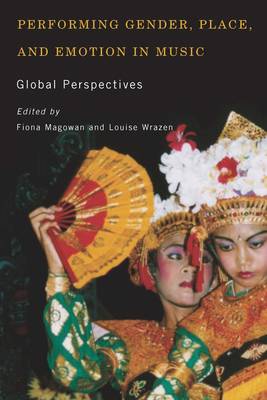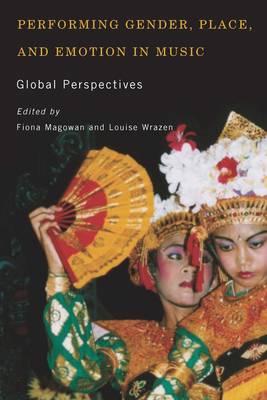
Door een staking bij bpost kan je online bestelling op dit moment iets langer onderweg zijn dan voorzien. Dringend iets nodig? Onze winkels ontvangen jou met open armen!
- Afhalen na 1 uur in een winkel met voorraad
- Gratis thuislevering in België vanaf € 30
- Ruim aanbod met 7 miljoen producten
Door een staking bij bpost kan je online bestelling op dit moment iets langer onderweg zijn dan voorzien. Dringend iets nodig? Onze winkels ontvangen jou met open armen!
- Afhalen na 1 uur in een winkel met voorraad
- Gratis thuislevering in België vanaf € 30
- Ruim aanbod met 7 miljoen producten
Zoeken
Performing Gender, Place, and Emotion in Music
Global Perspectives
€ 56,45
+ 112 punten
Omschrijving
Presenting a range of ethnographic case studies from around the globe, this edited collection offers new ways of thinking about the interconnectivity of gender, place, and emotion in musical performance. While ethnomusicologists and anthropologists have long recognized the theoretical connections between gender, place, and emotion in musical performance, these concepts are seldom analyzed together. Performing Gender, Place, andEmotion in Music is the first book-length study to examine the interweaving of these three concepts from a cross-cultural perspective. Contributors show how a theoretical focus one dimension implicates the others, creating anexus of performative engagement. This process is examined across different regions around the globe, through two key questions: How are aesthetic, emotional, and imagined relations between performers and places embodied musically? And in what ways is this performance of emotion gendered across quotidian, ritual, and staged events?
Through ethnographic case studies, the volume explores issues of emplacement, embodiment, and emotion in three parts: landscape and emotion; memory and attachment; and nationalism and indigeneity. Part I focuses on emplaced sentiments in Australasia through Vietnamese spirit possession, Balinese dance, and land rights in Aboriginal performance. PartII addresses memories of Aboriginal choral singing, belonging in Bavarian music-making, and gender-performativity in Polish song. Part III evaluates emotion and fandom around a Korean singer in Japan, and Sámi interconnectivitiesin traditional and modern musical practices. Beverley Diamond provides a thought-provoking commentary in the afterword. Contributors: Beverley Diamond, Fiona Magowan, Jonathan McIntosh, Barley Norton, Tina K. Ramnarine, Muriel Swijghuisen Reigersberg, Sara R. Walmsley-Pledl, Louise Wrazen, Christine Yano. Fiona Magowan is Professor of Anthropology at Queen's University, Belfast.
Louise Wrazen is Associate Professor of Music at York University.
Through ethnographic case studies, the volume explores issues of emplacement, embodiment, and emotion in three parts: landscape and emotion; memory and attachment; and nationalism and indigeneity. Part I focuses on emplaced sentiments in Australasia through Vietnamese spirit possession, Balinese dance, and land rights in Aboriginal performance. PartII addresses memories of Aboriginal choral singing, belonging in Bavarian music-making, and gender-performativity in Polish song. Part III evaluates emotion and fandom around a Korean singer in Japan, and Sámi interconnectivitiesin traditional and modern musical practices. Beverley Diamond provides a thought-provoking commentary in the afterword. Contributors: Beverley Diamond, Fiona Magowan, Jonathan McIntosh, Barley Norton, Tina K. Ramnarine, Muriel Swijghuisen Reigersberg, Sara R. Walmsley-Pledl, Louise Wrazen, Christine Yano. Fiona Magowan is Professor of Anthropology at Queen's University, Belfast.
Louise Wrazen is Associate Professor of Music at York University.
Specificaties
Betrokkenen
- Uitgeverij:
Inhoud
- Aantal bladzijden:
- 216
- Taal:
- Engels
- Reeks:
- Reeksnummer:
- nr. 5
Eigenschappen
- Productcode (EAN):
- 9781580465434
- Verschijningsdatum:
- 1/07/2015
- Uitvoering:
- Paperback
- Formaat:
- Trade paperback (VS)
- Afmetingen:
- 152 mm x 229 mm
- Gewicht:
- 326 g

Alleen bij Standaard Boekhandel
+ 112 punten op je klantenkaart van Standaard Boekhandel
Beoordelingen
We publiceren alleen reviews die voldoen aan de voorwaarden voor reviews. Bekijk onze voorwaarden voor reviews.










